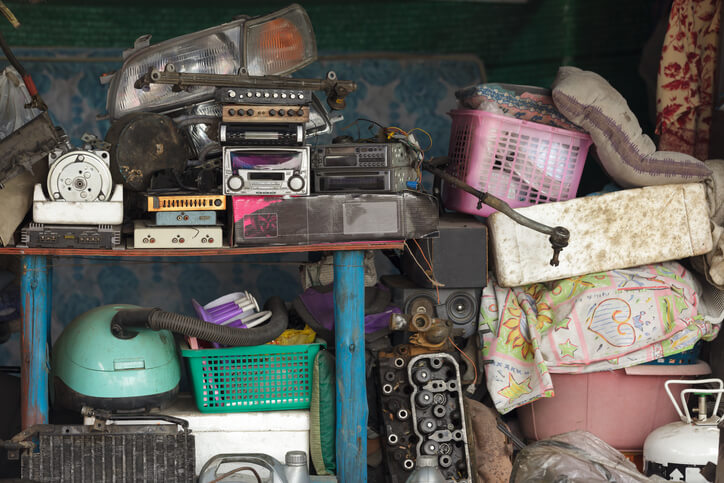Moving to a new home can be both exciting and stressful, especially if you haven’t moved in quite some time. As you start the process, it can be helpful to learn a few moving tricks and tips. But, even when you plan and prepare carefully, there still are plenty of opportunities for unexpected mishaps when moving day finally arrives.
Before you start the actual move, you’ll need to spend several weeks (or longer) planning your move—including the necessary decluttering and packing. (And where are you going to find enough moving boxes?)
While every move is different, there are several major areas that offer the potential for things to go wrong:
- packing mistakes
- issues with your landlord or seller
- problems with your moving company
Here’s a look at five moving horror stories you don’t want to have on moving day, along with tips on how to avoid them.
Furniture Fluke
When she was moving to New York City for a job, in her 20s, my friend spent a large chunk of her savings on a new oversized sofa and matching loveseat. She couldn’t wait to get them into her new apartment. On moving day, she called in tears: The movers tried and tried, but the sofa and loveseat would not fit up the narrow winding staircase in her historic Brooklyn building. After hours of trying, she had to leave the pricey furniture on the curb and spend more money to purchase a futon that would fit in her apartment.
How to avoid this: If you’re planning to purchase new furniture for your new place, be sure to measure doorways, staircases, and other passageways you’ll have to move the furniture through and make sure your purchases will fit.
Better yet, hold off on buying new items for your new home until after you’ve moved in. Sometimes a space feels larger before you’ve moved all your things in, and it’s easy to choose a rug, bookcase, or other items that are simply too overpowering for the room.
Just Junk
It’s not uncommon to move into a new place and find a forgotten item or two left by the previous occupants. But it’s completely unexpected to walk into your new home and find that it’s is still almost full of someone else’s belongings. Another acquaintance arrived to move into a new home and found the garage was piled with junk left behind by the previous owner. Because the previous owner had already moved out of state and was unwilling to handle the clean-out, my friend was forced to hire help to load up and haul off all the junk. It was an unexpected, and very unwelcome, extra expense.
How to avoid this: Before you close on a new home—or sign the lease on a new rental home—insist on taking a walk-through. During your walk-through, you can check to make sure everything is in good order and all the belongings of the previous occupants have been removed. This way, you can be sure the home is ready for you to move right in.
Mover Miscalculation
A good moving company can simplify your move, but a moving company with challenges can make your move even more stressful or outright miserable. For example, when moving companies aren’t able to fit everything in their trucks, they may leave their customers scrambling to find a way to move the remaining items on their own. My friends recently moved from Atlanta to Detroit, and although they’d contracted with a moving company to move everything in their home, on moving day, the movers said they couldn’t fit everything and left several large pieces of furniture and boxes behind. That meant my friend, who had never hauled a trailer, was required to rent a U-Haul trailer at the last minute, load it, and drive it almost 11 hours to the new house.
How to avoid this: Be selective when hiring professional movers to handle your move. Start by asking friends and neighbors which moving companies they recommend (and which ones they don’t). When you start calling movers, don’t make a choice based only on price. Ask for a company representative to visit your home or send them a video showing each room so they can better estimate how many trucks or what size truck will be needed to fit all your stuff.
Driver Delay
Some moving companies add as many customers’ belongings as possible to the same truck, which may mean you could end up waiting for days (or even weeks) to receive your belongings at your new location. Once when I relocated several states away, my employer paid the moving company. To get a better rate, my employer didn’t require immediate delivery of my belongings. Because my things didn’t fill the truck, it stopped to pick up and deliver several other people’s belongings on the way. That meant I arrived at my new home with only a suitcase—and lived out of that suitcase for more than a week before my furniture and other belongings arrived.
The point of moving day is to actually get your belongings moved into your new place so you can start settling into your new home. If your movers don’t get your stuff to you on time, or if they leave a big chunk of it at the old place, you won’t be able to accomplish your goal of getting moved.
How to avoid this: It’s a statement that bears repeating: Be selective when hiring professional movers to handle your move. Once you’ve made a decision, be sure the details about scheduling are included in your contract so you will have recourse if your belongings don’t show up on time. (Keep in mind, if you’re making a cross country move, that you may have to agree to a window of time for delivery rather than a specific day.)
Do your part to help ensure that your movers will do a good job: Understand the costs of moving, and be prepared to pay them. Also, tip your movers for a job well done.
Real-Time Realities
After closing on their new home, one family traveled several hundred miles back to their other home to pack, clean, and travel back again with all their belongings. When they arrived, they realized they’d misplaced the keys to the new home and couldn’t get into it. Instead of being able to unload the moving truck and start getting settled, they were stuck waiting until extended family members arrived with an extra set of keys.
Keys aren’t the only important items that are easy to misplace on moving day. In my last move, we misplaced the screws that we needed to reattach the mirror on my dresser. It’s also easy to misplace chargers for computers and phones. If it will take you several days or weeks to unpack everything, it’s important to remember to pack items you’ll need in the interim in a special, well-labeled place that you can access easily.
How to avoid this: As you’re dealing with the stress of moving and trying to manage the logistics, physical effort, and emotions that may be involved, it’s easy to neglect small (but important) details. To avoid overlooking something that could derail your moving day, keep a running list of the items and tasks you must remember. In the days and weeks leading up to your move, write down every important item or task that comes to mind and be sure to go through the list on moving day.
Rather than experiencing your own moving horror story…
- take the time to plan ahead carefully
- make sure you’re using reputable moving services
- relax when you can
The stress will be over soon.
Moving to a new home—whether it’s only across town or across the country—can be filled with challenges. If you’ve endured your own “moving horror story,” please share your experience with us in the comments below.







Ever try moving a 900 pound piano and a 4 bedroom house full of stuff , and just as you are packing, you have a slip and fall and break your back and hip?
The piano has wheels , maybe the commuter bus 2 miles away will let you put the piano on the front bike rack! Maybe the hoodlums in the neighborhood won’t take everything else of value while you magically find movers to bring your things to the new location.
Being a fighter helps in this situation. The people that stole the items that can’t ever be replaced with money can live it up in state prison.
US Federal Attorneys have the ability to fight these moving companies and fraudulent interference cases head on. Even sometimes successful in finding and returning lost and missing heirloom pieces. The FBI Now has a huge team dedicated only for searching and retrieving stolen heirloom pieces.
When our rights to life liberty and the pursuit of happiness are infringed upon in the USA, by ne’re do wells and scammers, the FTC.gov , the US Federal Courts have an Ombudsman that can direct you to the correct people.
Even if you are bedridden you still have rights.
An Ombudsman can also make sure you have a licensed and bonded person to right the issues and argue your case.
My broken back and hip are mostly good now, and the crooks that hurt me and my children will never have peace.
Please contact the US Federal Courts Ombudsman on your case . They are knowledgeable in these situations and companies, and have a correct listing of cases and companies they have or are suing.
Hi, I’m Rozze. I’m on the hunt for a gardener coffee table for our family and this one is dreamy! I searched and searched, finally, I bought it for the best-discounted price of 20% off at Horchow, by choosing a deal from MyCoupons. OO!! I loved my table 🙂
We’ve made many moves through the years (including several cross-country) and though I’ve used movers who were highly recommended by friends and co-workers, I’ve still had problems. Movers have come to the house, checked out everything we intend to move and then as they were unloading, two have told me that they had other jobs to load and would “just unload everything in the garage”! Needless to say, that was not going to happen. One, when I said “Absolutely not, I have a contract and you will put furniture and boxes where I tell you to” shrugged and did so. The other just ignored me and began to unload everything into the garage. I was lucky that my son-in-law went out and talked to them and they finally did as they were supposed to. In another move, also paid for by my company, the movers were told we had a car that would be moved along with my belongings, but the truck they brought was obviously too small for that. I reminded them twice that we had a car that had to be loaded and called my company representative…they filled the van and took off for CA. Luckily, my company paid to have a mover who specializes in cars, move ours. As for having people leaving a garage filled with stuff, my realtor took care of that for me. Moving is a hassle!
You addressed this email to Tom and Helen. Please change that to Tom and Molly. Helen died 10 years ago and I have moved on.
Thanks,
Tom Mangette
Hi Tom- our email team is looking into this. We apologize for the wrong address.
We used a major moving company to move from one state to another and for delivery in a specific date. Truck arrived early and apartment not ready. Driver seemed surprise at the specified date and said he couldn’t wait. We had to find two 20 ft storage units approximately 15 miles away truck was offloaded there and we had to get local mover two days later.
After checking bell gongs, found that 48 Inc tv was missing as box marked “tv” contained pictures. TV was found two weeks later still on truck. We wouldn’t accept delivery unless had opportunity to check that tv still worked after remaining on truck for two weeks.
Mover would only deliver tv and not wait for it to be checked out.
Didn’t accept delivery. Had insurance and filed claim which was denied as didn’t cover internal component damage (if there had been any).
So, moral of story is be sure of agreed upon delivery date and, if possible, tell driver on pack and move day. Also ask extensive questions about what insurance covers before committing to purchase.
Be skeptical of the moving company even if a well known major company. Ask lots of questions and read reviews.
Great advice- Charlie! Thanks for sharing.
We spent several evenings in our new place without benefit of TV, since we couldn’t find the remotes.
I’ve moved multiple times using both local and national companies. Several times a box has been missing or stolen. I’m planning one “last” interstate move within the year, so have been selecting and packing all my smalls in strong liquor boxes, which can generally be had for free at liquor stores. They are small enough to lift. This time I’m numbering each box, packing it tight, and recording the contents in a journal. This is time-consuming, but it will be easier to make a claim if needed. I’ve also learned that my most precious items are best hand-carried in my car. Like my cat. 🤣
Your email ad encourages me to add roadside assistance /towing to my policy. You should know that I cancelled that policy portion this year as it was operated by contractors as a borderline scam .
Specifics were $75 coverage but caller from Az. demanded a $38 surcharge before approving a battery jump start. I declined. Installed new battery myself. Jump start guy showed up, not needed. But I asked his price “$35”. Scam for me and your company as $75 should have cover Cancelled roadside assistance as useless.
We apologize for your roadside experience Mr. Olgeirson. Our roadside assistance coverage works in two ways – The Hartford offers a Rescue 1-800 hot line you can call to receive emergency road service free of charge when you carry the towing and labor coverage on your policy. If you call another towing roadside service number, you will have to pay the service provider’s fee at the time of service and then send in your receipt to us after to get reimbursed up to the $75 coverage limit. If you’d like to learn more, please call our Customer Service Department at 1-877-896-9320 and our representatives will be happy to help.
Thanks for the article. It made me realize how lucky I was that I had no serious problems on my move from Illinois to California about 25 years ago.
I’m so sorry that you’ve run into some unscrupulous people. It just amazes me that people working such a service industry and can be so dishonest.
Moving from Hawaii to Virginia (or any Mainland state) caused major warping of my koa dining table and entertainment center, along with several smaller wood objects, most, including the table and entertainment center, created by my recently deceased husband. It’s the change from humid to dry, or maybe crossing the ocean, that causes the warping. I now wish I had sold all those things–but my husband made them! Koa is a tree indigenous to Hawaii and quite rare, therefore expensive. The table is now in the hands of someone who may–or may not–be able to repair it.
Elaine- we are sorry for the recent passing of your husband. Thanks for reading!
You must watch the movers when they number the boxes. Sometimes, they will leave a few off and when you are in your new home and the movers start counting the boxes it will not be missing anything…but as you start to put things away you’ll notice you’re missing some items. Beware and watch them number the boxes.
This is great advice, Richard. Always be mindful of what is moving.
I hired a major moving company to move me from California to Florida 18 years ago. When they arrived, there was damage to many boxes (meaning there was some type of accident on their way). While I had paid for replacement insurance, they calculated the value of the loss way under the replacement value. I am disabled and did not own a computer (and could not sit or stand for extended periods). Driving around, trying to find my custom items at a store was not possible. Example: I owned a solid brass floor lamp that had white ceramic decorative moldings with gold decorative painting at various locations on the pole. It also had a 3-way center bulb (100-watt, 150-watt, and 250-watt) in the center with three candelabra (flame-shaped) bulbs (each 40-60-watt each) in a decorative formation around the center bulb. The 3-way switch allowed only the center bulb to be lit, only the candelabra bulbs, or all four bulbs to be turned on. It cost me close to $400 in 1990 (moved in 2002). It would have been difficult to replace, as that type of detail and quality(solid brass and its design) is not manufactured often. They wanted to give me $150 for it (replacement value was probably around $800-$1000). The brass tubing (going to candelabra bulbs) was bent and brass was scratched. I never found my items before the time period to replace ran out. I had not paid attention to the details and did not have the resources to find their replacements. Read everything. Their books are not accurate and undervalue custom pieces.
Also one of the packers told the driver that he had not ticketed a couple of the items. He told them to mind their own business and that he had handled it. Sure enough, those items were missing at the end. He must have known he could sell them and purposely did not tag them properly. (It is very difficult to count every single item on their list as often one does not know under what category of furniture a piece was included.)
Also, later I was told by the company that I was not supposed to tip the workers that were hired by the driver. My driver told me that I needed to, so I did.
Since moving to Florida, I have been scammed multiple times. It seems that contractors and service people know the ropes and how to get away with their scam. It is sad, but I feel being disabled (mostly bedridden) has given scammers the knowledge that it is difficult for me to fight back (takes a lot of time to prepare for even small claims court cases) and they have taken advantage of the circumstances.
Thank you for sharing your story, Darlisa.